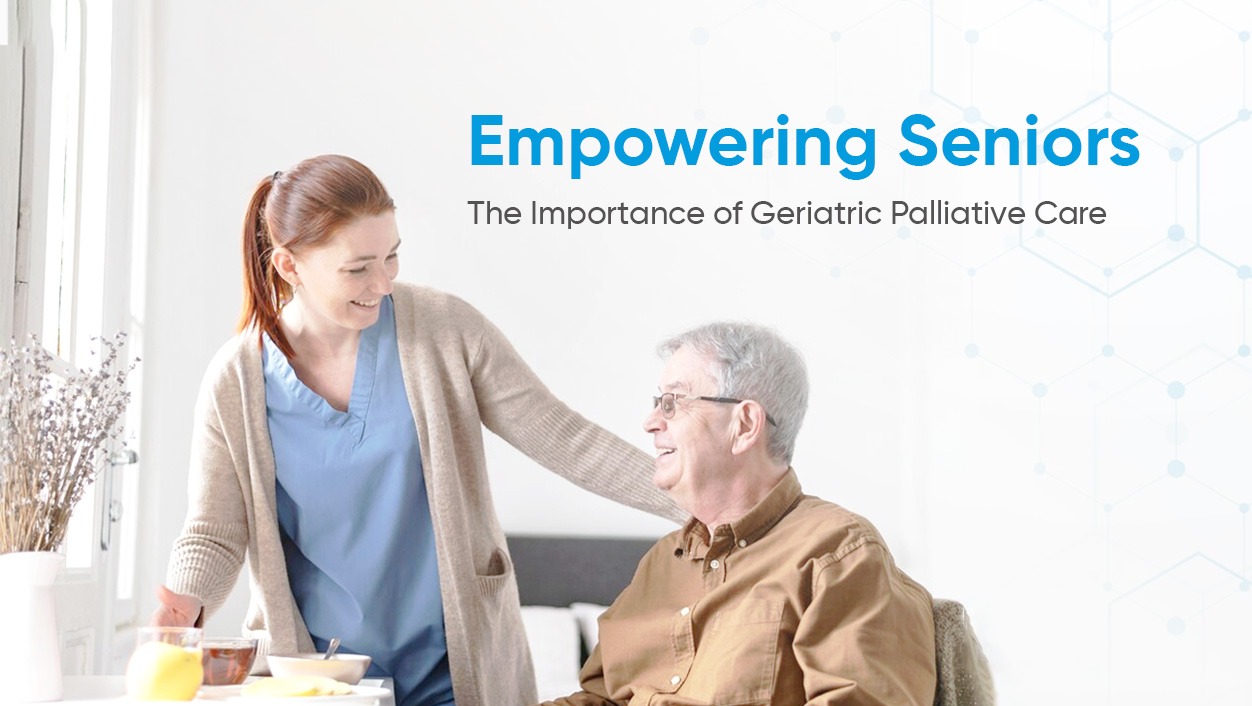As the global population ages, the significance of geriatric palliative care becomes increasingly pronounced. The unique challenges faced by seniors, coupled with the complexities of aging-related illnesses, necessitate a specialized and holistic approach to healthcare.
In this article, we delve into the importance of geriatric palliative care, exploring its multidimensional impact on the well-being of seniors and their families.
Understanding Geriatric Palliative Care: Addressing the Unique Needs of Older Adults
Geriatric palliative care is a specialized form of healthcare designed to address the unique needs of older adults facing serious and life-limiting illnesses. Unlike traditional medical care, which often focuses solely on disease management, geriatric palliative care takes a comprehensive approach, considering the physical, emotional, social, and spiritual dimensions of health.
The primary goal of geriatric palliative care is to enhance the quality of life for seniors and their families by managing symptoms, relieving pain, and providing support through the challenges associated with aging and terminal illnesses. This approach is not exclusively for those at the end of life but is applicable at any stage of a serious illness, fostering a continuum of care that evolves with the changing needs of the individual.
Holistic Care for Seniors: Addressing Physical, Emotional, and Spiritual Dimensions
One of the key aspects that sets geriatric palliative care apart is its emphasis on holistic care. Aging often brings forth a myriad of health issues, from chronic conditions to cognitive decline, and addressing these challenges requires a multifaceted approach.
Geriatric palliative care teams typically include healthcare professionals from various disciplines, such as physicians, nurses, social workers, and chaplains, working collaboratively to address the diverse needs of the elderly.
This holistic care model considers not only the physical symptoms but also the psychological and emotional aspects of aging. Seniors facing serious illnesses may experience anxiety, depression, and existential concerns about the end of life.
Geriatric palliative care provides a supportive environment where these emotional and spiritual dimensions are acknowledged and addressed, empowering seniors to navigate the complexities of their health with resilience and dignity.
Enhancing Communication and Decision-Making: Empowering Seniors Through Shared Care
Empowerment in geriatric palliative care is closely tied to effective communication and shared decision-making. Seniors, along with their families, are actively involved in discussions about their care preferences, treatment options, and end-of-life decisions. This collaborative approach ensures that the care provided aligns with the values and goals of the elderly individual, promoting a sense of control and autonomy.
Empowering seniors through transparent communication also extends to addressing their fears and concerns. Many older adults worry about becoming a burden to their families or losing control over their lives. Geriatric palliative care professionals engage in open and honest conversations, helping seniors express their wishes and providing the necessary support to alleviate these anxieties.
Preserving Dignity in later stages of life: Honoring Individual Values and Preferences
Preserving dignity is a fundamental aspect of geriatric palliative care. As seniors approach the end of life, maintaining a sense of dignity becomes increasingly important. This involves respecting the individual’s values, cultural beliefs, and personal preferences. Geriatric palliative care recognizes the unique life stories of each senior and seeks to create a care plan that honors their identity and experiences.
This emphasis on dignity extends to the management of physical symptoms and pain. Seniors may experience a range of symptoms, from pain and fatigue to nausea and shortness of breath. Geriatric palliative care prioritizes the effective management of these symptoms, ensuring that seniors can maintain a level of comfort that allows them to engage with their families and surroundings in a meaningful way.
Family Support and Education: Empowering Caregivers for Optimal Care
Empowering seniors in the context of geriatric palliative care also involves supporting their families. Caregivers often play a crucial role in the lives of older adults, providing both practical assistance and emotional support. Geriatric palliative care recognizes the strain that caregiving can place on families and offers resources and education to help them navigate the complexities of providing care to a loved one with a serious illness.
Education is a powerful tool for empowering families to make informed decisions about the care of their elderly relatives. Geriatric palliative care professionals provide information about the prognosis, treatment options, and available support services. This knowledge equips families to actively participate in the care process, fostering a sense of empowerment and confidence in their ability to provide the best possible care for their loved ones.
The Future of Geriatric Palliative Care: Innovation, Accessibility, and Cultural Awareness
As we look to the future, the integration of geriatric palliative care into standard healthcare practices is essential. The aging population is a demographic reality that demands a proactive and comprehensive approach to address the unique needs of seniors. By prioritizing geriatric palliative care, healthcare systems can ensure that older adults receive the specialized and compassionate care they deserve.
Advancements in medical knowledge and technology offer new opportunities to enhance geriatric palliative care. From innovative treatments to telehealth options that increase accessibility, ongoing research and development can further improve the quality of care provided to seniors facing serious illnesses. Additionally, efforts to raise awareness about the benefits of geriatric palliative care can contribute to a cultural shift in how society perceives and approaches end-of-life care for the elderly.
Takeaway:
In conclusion, empowering seniors through geriatric palliative care is a multifaceted endeavor that encompasses physical, emotional, and social dimensions. By embracing a holistic and collaborative approach, healthcare professionals can enhance the quality of life for older adults facing serious illnesses, providing support that extends beyond medical interventions to address the core values and preferences of the individual.
As the global population continues to age, investing in and advancing geriatric palliative care is not just a healthcare imperative but a commitment to ensuring that our seniors age with dignity, comfort, and the respect they deserve.

